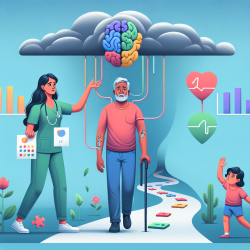Understanding Post-Stroke Depression: A Critical Component in Rehabilitation
Post-stroke depression (PSD) is a prevalent and often overlooked condition that can significantly impact the rehabilitation outcomes of stroke survivors. According to a study published in Neurology Research International, approximately 29% of individuals experience depressive symptoms following a stroke. This statistic underscores the importance of addressing PSD in rehabilitation settings to optimize recovery and improve quality of life for patients.
Key Findings from the Study
The study, "Depressive Symptoms in Individuals after Stroke in a Home-Based Rehabilitation Setting," provides valuable insights into the factors associated with PSD. Conducted by Vermeer et al. (2018), the research involved a retrospective review of 889 patients who participated in a home-based rehabilitation program. The study utilized the Patient Health Questionnaire (PHQ-9) to assess depressive symptoms and identified several key predictors of moderate to severe depression:
- Referral Source: Patients referred from outpatient or community settings were more likely to experience moderate to severe depressive symptoms compared to those referred from acute settings.
- Age: Younger patients were found to have a higher likelihood of experiencing significant depressive symptoms.
- Reintegration to Normal Living Index (RNLI): Lower scores on the RNLI, which measures a patient's involvement in social activities, were associated with greater depressive symptoms.
Implications for Practitioners
Understanding the predictors of PSD is crucial for practitioners aiming to improve rehabilitation outcomes. Here are some strategies to consider:
- Screening and Monitoring: Implement routine depression screenings for all stroke patients, regardless of the clinical setting. Early identification of depressive symptoms can lead to timely interventions.
- Customized Interventions: Tailor rehabilitation programs to address the unique needs of younger patients and those with lower RNLI scores. Consider incorporating social and community reintegration activities to enhance engagement and reduce isolation.
- Collaborative Care: Foster a multidisciplinary approach by involving mental health professionals in the rehabilitation process. This collaboration can help address the psychological aspects of recovery and improve overall outcomes.
Encouraging Further Research
While the study provides valuable insights, further research is needed to explore the long-term effects of PSD and the efficacy of various intervention strategies. Practitioners are encouraged to contribute to this body of knowledge by conducting studies within their own clinical settings and sharing findings with the broader community.
To read the original research paper, please follow this link: Depressive Symptoms in Individuals after Stroke in a Home-Based Rehabilitation Setting.










